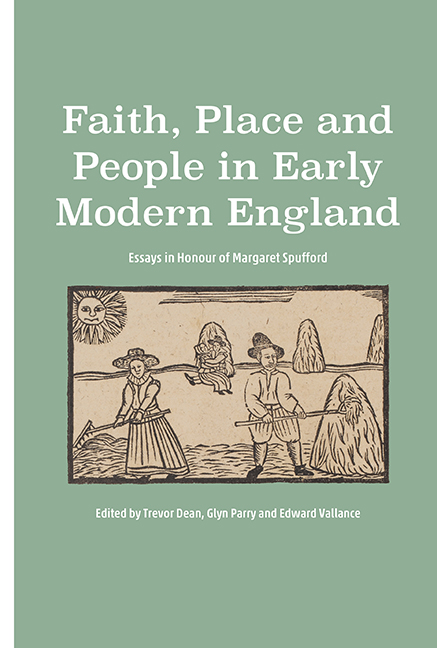Book contents
- Frontmatter
- Dedication
- Contents
- List of Illustrations
- List of Contributors
- Record Office Abbreviations
- Acknowledgements
- Introduction
- Margaret
- Part I Faith
- Part II Place
- 4 The Heralds and the Hearth Tax
- 5 The Hearth Tax and the Poor in Post-Restoration Woking
- 6 Reassessing the English ‘Financial Revolution’: Credit Transferability in Probate Records of Sedbergh and Maidstone, 1610–1790
- Part III People
- Bibliography of Margaret Spufford's works
- Index
- Tabula in Memoriam
6 - Reassessing the English ‘Financial Revolution’: Credit Transferability in Probate Records of Sedbergh and Maidstone, 1610–1790
from Part II - Place
Published online by Cambridge University Press: 19 July 2019
- Frontmatter
- Dedication
- Contents
- List of Illustrations
- List of Contributors
- Record Office Abbreviations
- Acknowledgements
- Introduction
- Margaret
- Part I Faith
- Part II Place
- 4 The Heralds and the Hearth Tax
- 5 The Hearth Tax and the Poor in Post-Restoration Woking
- 6 Reassessing the English ‘Financial Revolution’: Credit Transferability in Probate Records of Sedbergh and Maidstone, 1610–1790
- Part III People
- Bibliography of Margaret Spufford's works
- Index
- Tabula in Memoriam
Summary
When could early modern society exchange formal credit instruments (a loan drawn up between two parties promising a fixed rate of repayment) without redrawing the terms? The question has implications for understanding how credit could supplement the cash supply and informal credit system, and the context which drove the need for transferable credit. Without surviving written credit instruments, it has been difficult for historians to understand how these instruments functioned. Using the probate record research methodology refined by Margaret Spufford and Peter Spufford offers the opportunity to answer these questions about the development of credit transferability, by studying the incidence of credit instruments in probate records. This has implications for the idea of a ‘Financial Revolution’ popularised by Dickson in 1967. In this theory, at the end of the seventeenth century the Bank of England and Treasury led innovations in transferable, assignable credit instruments, which made formal credit available to common people. Wennerlind was one of the first to challenge the periodisation of the Financial Revolution, arguing that changes in the conceptualisation of money occurred earlier. Recent scholarship by Muldrew and Coffman has moved the focus onto how innovation in the uses of credit was driven by public needs. Using Margaret Spufford's probate research, this article shows that as written credit instruments could be bequeathed to others without changing terms, they were transferable between persons and could supplement the lack of cash in the economy. This occurs from a far earlier point than Dickson's theory describes, with references to bonds and bills occurring from 1610, a century before the 1710 Act of Anne confirmed the transferability of promissory notes – demonstrating that the formalisation of credit did not occur as a result of government innovation. The appearance of formal credit in probate records in such different areas as Maidstone in Kent and Sedbergh in the West Riding of Yorkshire indicates that the lack of cash and need to support vulnerable people with an income on capital were consistent issues in varied areas. Adding colour to this conclusion are the debates on usury in published sermons, which indicate by their detail and permissiveness that lending at interest was in fact an accepted practice from the earliest point of this study.
- Type
- Chapter
- Information
- Faith, Place and People in Early Modern EnglandEssays in Honour of Margaret Spufford, pp. 132 - 150Publisher: Boydell & BrewerPrint publication year: 2018



